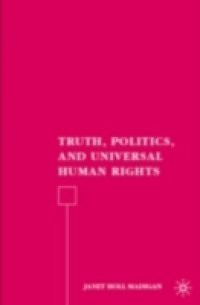This book uses the concept of universal human rights to explore the relationship between the individual, society, and truth. The Universal Declaration of Human Rights was meant to provide a moral standard for judging the state's treatment of the individual, but some still contend that the principles expressed therein are not universal, but culturally relative. To answer the question of whether we can say something universally true about human beings while lacking the philosophical means to do so coherently, the author explores the changing relationship between truth and politics from Plato to Locke.

